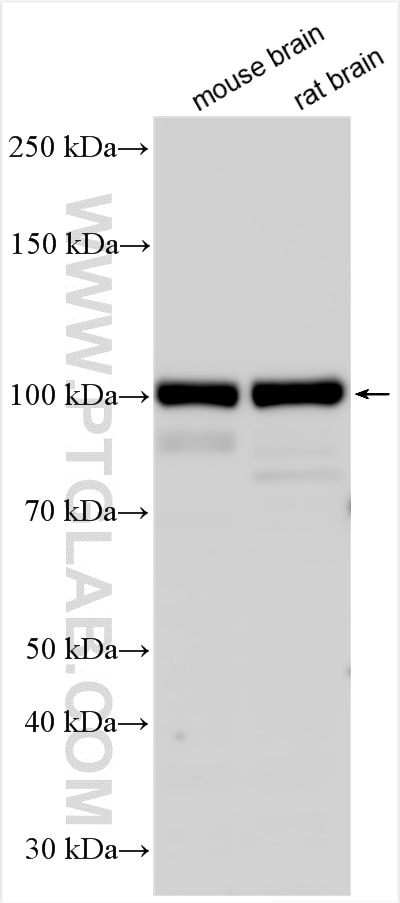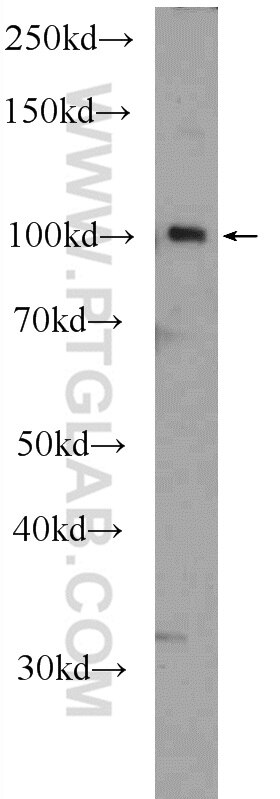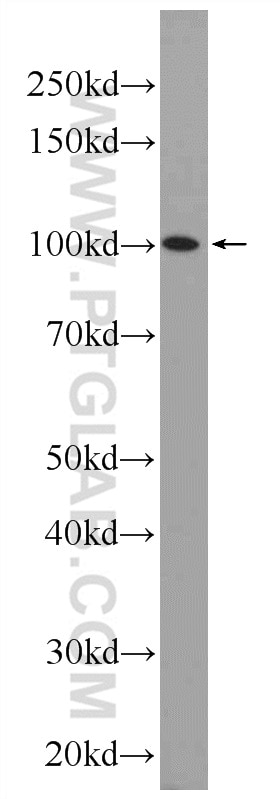SFMBT2 Polyklonaler Antikörper
SFMBT2 Polyklonal Antikörper für WB, ELISA
Wirt / Isotyp
Kaninchen / IgG
Getestete Reaktivität
Maus, Ratte
Anwendung
WB, ELISA
Konjugation
Unkonjugiert
Kat-Nr. : 25256-1-AP
Synonyme
Galerie der Validierungsdaten
Geprüfte Anwendungen
| Erfolgreiche Detektion in WB | Maushirngewebe, Mausmilzgewebe, NIH/3T3-Zellen, Rattenhirngewebe |
Empfohlene Verdünnung
| Anwendung | Verdünnung |
|---|---|
| Western Blot (WB) | WB : 1:500-1:3000 |
| It is recommended that this reagent should be titrated in each testing system to obtain optimal results. | |
| Sample-dependent, check data in validation data gallery | |
Produktinformation
25256-1-AP bindet in WB, ELISA SFMBT2 und zeigt Reaktivität mit Maus, Ratten
| Getestete Reaktivität | Maus, Ratte |
| In Publikationen genannte Reaktivität | Maus |
| Wirt / Isotyp | Kaninchen / IgG |
| Klonalität | Polyklonal |
| Typ | Antikörper |
| Immunogen | SFMBT2 fusion protein Ag19379 |
| Vollständiger Name | Scm-like with four mbt domains 2 |
| Berechnetes Molekulargewicht | 894 aa, 101 kDa |
| Beobachtetes Molekulargewicht | 100 kDa |
| GenBank-Zugangsnummer | BC152430 |
| Gene symbol | SFMBT2 |
| Gene ID (NCBI) | 57713 |
| Konjugation | Unkonjugiert |
| Form | Liquid |
| Reinigungsmethode | Antigen-Affinitätsreinigung |
| Lagerungspuffer | PBS mit 0.02% Natriumazid und 50% Glycerin pH 7.3. |
| Lagerungsbedingungen | Bei -20°C lagern. Nach dem Versand ein Jahr lang stabil Aliquotieren ist bei -20oC Lagerung nicht notwendig. 20ul Größen enthalten 0,1% BSA. |
Hintergrundinformationen
SFMBT2 (Scm like with four mbt domains 2), also named as KIAA1617. It is located in Nucleus and ubiquitous expression in thyroid and ovary. The calculated molecular weight of SFMBT2 is 100 kDa. Although mammalian SFMBTs have similar structural features with PcG protein dSFMBT, biological function and target genes of SFMBT have been not investigated well. Lee K and Na W investigated biological function of human SFMBT2 that interacted with YY1 using AR (androgen receptor)-negative DU145 prostate cancer cells. They found that human SFMBT2 represses HOXB13 gene expression via its association with methylated histones H3 and H4 that are transcriptional repression marks. Furthermore, their findings indicate that SFMBT2 may be involved in regulation of cell growth of DU145 prostate cancer cells (PMID: 23385818).
Protokolle
| Produktspezifische Protokolle | |
|---|---|
| WB protocol for SFMBT2 antibody 25256-1-AP | Protokoll herunterladen |
| Standard-Protokolle | |
|---|---|
| Klicken Sie hier, um unsere Standardprotokolle anzuzeigen |
Publikationen
| Species | Application | Title |
|---|---|---|
Cell Stem Cell Overcoming Intrinsic H3K27me3 Imprinting Barriers Improves Post-implantation Development after Somatic Cell Nuclear Transfer. | ||




